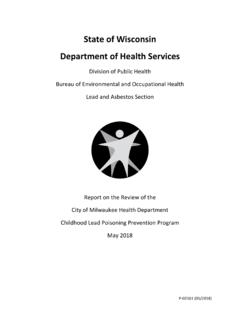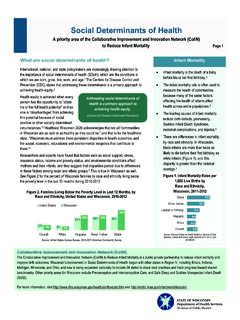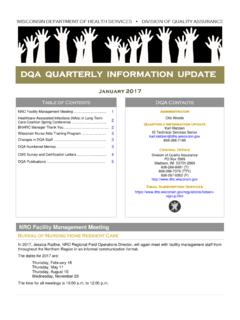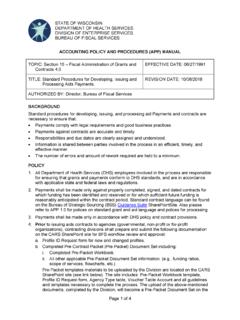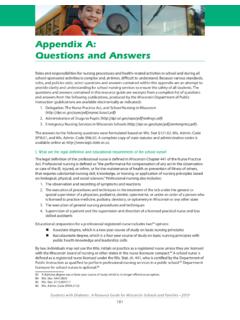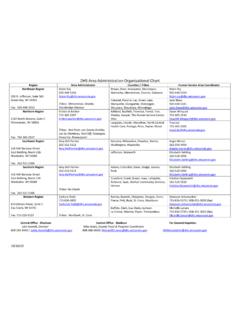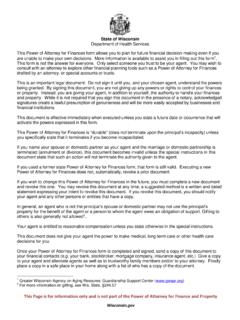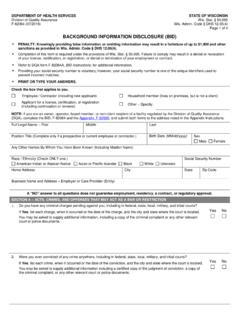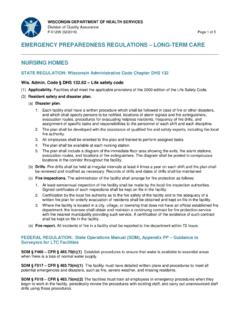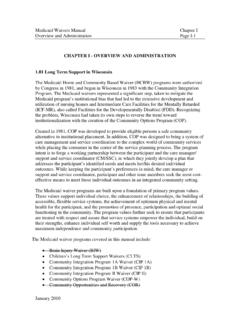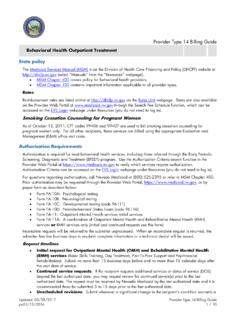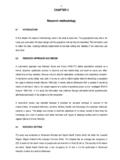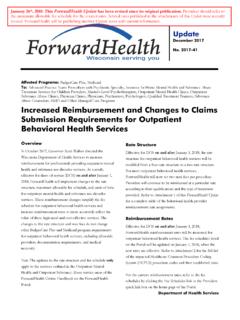Transcription of Coding, Billing and Reimbursement Manual
1 Screening, Brief Intervention and Referral to Treatment SBIRT. Coding, Billing and Reimbursement Manual Prepared For: Wisconsin Initiative to Promote Healthy Lifestyles (WIPHL). January 2010. Table of Contents Chapter 1 Background Information General Background - Overview on the Status of Billing Recognition Chapter 2 Key Clinical Definitions General Brief Screen Assessment or Full Screen Brief Intervention Referral Brief Treatment Follow-up Clinical Service Definitions for Billing Screening Intervention Chapter 3 SBIRT Billing Codes General SBIRT Service Providers The Code Sets CPT Codes HCPCS Codes Medicare Medicaid Evaluation and Management (E&M) Coding ICD-9-CM Diagnosis Coding Health Professional Shortage Areas Reimbursement Chapter 4 Medicare Billing & Reimbursement General Coding and Reimbursement Incident-to Site of Service Office Hospital Outpatient Inpatient Emergency Department FQHC, RHC.
2 Resident Billing Moonlighting Services Provided Outside the Scope of Approved Training Programs Chapter 5 Medicaid Billing & Reimbursement General Eligibility Screening and Intervention Services Screening Intervention Services for Pregnant Women Training and Requirements for Eligible Providers Training for Licensed Health Care Professionals Training for Unlicensed Health Care Professionals Coding, Billing and Documentation Requirements Screening Requirements Intervention Requirements Reimbursement Chapter 6 Commercial Insurance Billing & Reimbursement General Supervision of Ancillary Services Contracting Coding & Reimbursement Chapter 7 Compliance General The Seven Elements of a Compliance Plan Is it a Compliance Issue? Fact or Fiction Can I Ask a Colleague or Another Entity What they Charge for a Particular Service? Can I Charge Self-pay Patients Less Than my Standard Fee?
3 May I Charge Medicare and Medicaid patient for No-show Appointment? When Can I Waive Co-pays and Deductibles? Must I Charge All Payers the Same Fee? Chapter 8 Smoking Cessation General Current Procedural Terminology (CPT) Codes for Smoking Cessation Services Billing Medicare for Smoking and Tobacco Cessation Smoking and Tobacco Cessation Provided by Health Educators Billing Wisconsin Medicaid for Smoking and Tobacco Cessation Prescription Drugs Commercial Insurance Billing Tips Reimbursement Reimbursement Resources Appendix A Sample Medicaid Document for Health Educators Chapter 1 Background Information General The purpose of this document is to provide Wisconsin clinic and administrative staff with guidance on obtaining Medicare, Medicaid and commercial insurance payment for SBIRT services. This document will be updated as appropriate to reflect the ongoing changes in policy and regulation.
4 - Background Most of the clinical sites that have been working with the Wisconsin Initiative to Promote Healthy Lifestyles (WIPHL) to implement alcohol and drug screening, brief intervention, and referral-to-treatment (SBIRT) services are supported through WIPHL's grant funding from the Substance Abuse and Mental Health Services Administration (SAMHSA). One of WIPHL's main objectives is to determine ways to support the program's sustainability so that SBIRT services can continue throughout the state even after grant funding ends in August 2011. Some sites and practitioners may decide to continue providing SBIRT. services simply because they are an important component of good, comprehensive health care. However, identifying ways to secure payment for providing SBIRT services will be a key strategy to promote widespread implementation of SBIRT services.
5 - Overview on the Status of Billing Recognition SBIRT coding and Billing policies and regulations are a patchwork in evolution. There are three Billing methods that must be considered for purposes of Reimbursement for SBIRT services. Coding and coverage policy varies based on payer: Medicaid, Medicare, and commercial health plans. While Medicare is already providing payment for services, bills can be submitted only for patients who are seen for illness or injury. As a result of the Medicaid and BadgerCare Plus Rate Reform Project and the 2009-2011. state biennial budget (2009 Wisconsin Act 28), Wisconsin Medicaid has expanded the SBIRT benefit for all patients and for a wide-range of provider types. Nationally, implementation of Billing codes varies across commercial health plans. In certain scenarios, Reimbursement may also be sought using appropriate evaluation and management (E&M) codes based on standard components or time criteria.
6 Under the current patchwork, providers may be eligible for Reimbursement for a majority of their patients. However, great care must be taken to ensure compliance in service delivery and bill submission. Chapter 2 Key Clinical Definitions - General This chapter provides an overview of the key clinical definitions integral to the provision of SBIRT services and the related Billing definitions of such services. - Brief Screen A screen is defined as "a rapid, proactive procedure to identify individuals who may have a condition or be at risk for a condition before obvious manifestations occur." A brief screen may involve one to several short questions relating to drinking and drug use. A. brief alcohol and drug screen is considered an integral part of routine preventive care and is therefore not separately reimbursable by Medicare, Medicaid, or private payers.
7 Brief screens may be administered by providers or any other staff member. They may be administered in writing, orally, or via various technologies. - Assessment or Full Screen Assessments or full screens more definitively categorize a patient's substance use. Assessments are indicated for patients with positive brief screens and for patients with signs, symptoms, and medical conditions that suggest risky or problem drinking or drug use. Providers may be able to obtain Reimbursement for conducting assessments according to their clinical judgment. However, some payers may require that structured, validated questionnaires be used, especially if ancillary providers are administering services. Examples of such questionnaires are the Alcohol Use Disorders Inventory Test (AUDIT), the Drug Abuse Screening Test (DAST), and the Alcohol, Smoking and Substance Involvement Screening Test (ASSIST).
8 An assessment places the patient on a continuum of use and suggests whether no intervention, brief intervention, brief treatment, or a referral to treatment is appropriate. A brief assessment or full screen is reimbursable when other requirements are met. - Brief Intervention Brief interventions are interactions with patients which are intended to induce a change in a health-related behavior. Often one to three follow-up contacts are provided to assess and promote progress and to evaluate the need for additional services. Brief interventions are typically used as a management strategy for patients with risky or problem drinking or drug use who are not dependent. This may include patients who may qualify for a DSM-IV diagnosis of alcohol or drug abuse and patients who may not qualify for any DSM-IV substance-related diagnosis.
9 - Referral Patients who are likely alcohol or drug dependent are typically referred to alcohol and drug treatment experts for more definitive, in-depth assessment and, if warranted, treatment. - Brief Treatment A brief treatment is a planned, several-session course of interaction with patients designed to help patients with alcohol or drug use disorders quit or cut down or reduce the negative impacts of substance use on their lives. Brief treatment is typically provided to patients with likely dependence who cannot or will not obtain conventional treatment, or to other patients with numerous and serious negative consequences of their drinking or drug use (which usually qualifies for a DSM-IV diagnosis of abuse). Brief treatments may also be provided to patients who are receiving pharmacologic treatment for alcohol or opioid dependence in general healthcare settings.
10 - Follow-up Follow-up services include interactions which occur after initial intervention, treatment, or referral services, and which are intended to reassess a patient's status, assess a patient's progress, promote or sustain a reduction in alcohol or drug use, and/or assess a patient's need for additional services. - Clinical Service Definitions for Billing In general, billable services are referred to as either screening or intervention services. - Screening For general Billing purposes, screening is defined as administration of a full screen or brief assessment (see Section ). Administering a brief screen (see Section ) is not a billable service. - Intervention A billable intervention service could be any of the following: A session of brief intervention (see Section ). A session of brief treatment (see Section ). A session in which a referral is made or attempted(see Section ).
